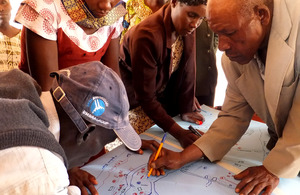DFID research: Transforming cash transfers
The ODI have published 6 country reports on the effectiveness of cash transfers

Beneficiaries of a cash transfer scheme on Kwakavisi community in Kenya undertaking a mapping exercise.
The Overseas Development Institute (ODI) has just published 6 reports on Transforming cash transfers: beneficiary and community perspectives on social protection programming.
DFID commissioned ODI to carry out the research in 5 of the 12 countries where DFID is currently supporting cash transfer programmes (Kenya, Mozambique, Occupied Palestinian Territories, Uganda and Yemen). The research was carried out in partnership with national research teams.
The purpose of the research is to provide robust evidence from the perspective of beneficiaries and their communities that will improve the quality and effectiveness of cash transfer programmes.
Cash transfers are predictable payments made directly to poor people. There is growing evidence that cash transfers have a range of positive effects (Cash Transfers Literature Review, 2011), and are good value for money (Public Accounts Committee Report on Transferring Cash and Assets to the Poor, 2012).
However the evidence varies - it is strong, for example, on reducing poverty and hunger, and helping people to access health and education services. But it is weaker on more transformational effects; there is strong logic but little evidence of the effects of cash transfers on citizens’ voice, empowerment, gender equality, social cohesion and state-building.
Including beneficiaries and their communities more systematically in monitoring and evaluation of cash transfer programmes should improve programme effectiveness in at least 3 ways:
- Value for money - participatory methods can help capture benefits and costs (particularly social) and effects (particularly transformational) which are harder to measure, and sometimes unintended
- Feedback loops - rich personal beneficiary and community views on programme design, implementation (what is working and what is not) and effects, offer a different perspective. Combined with other monitoring and evaluation information, this strengthens the evidence base from which programme and policy improvements can be made
- Accountability - participation in programme monitoring and evaluation enables citizens to better hold their governments and development partners to account
These country reports are the first of several sets of outputs from the research project. Briefing papers, synthesis products and guidance for beneficiary participatory in monitoring and evaluation of cash transfer programmes will be available in 2013.
The research project has also used a range of innovative participatory communications methods and tools (participatory photography and a documentary) to communicate findings in an engaging and accessible format to a wider audience. Importantly it is also a means of engaging research participants as collaborators in the narrative construction/story-telling process in ways that promote authorship and ownership.
Updates to this page
-
Added link to ODI website and reports
-
First published.